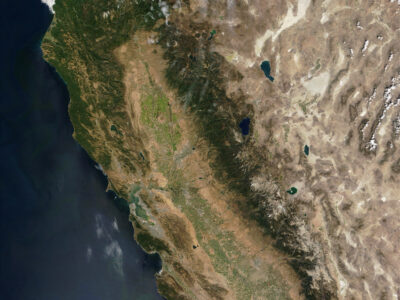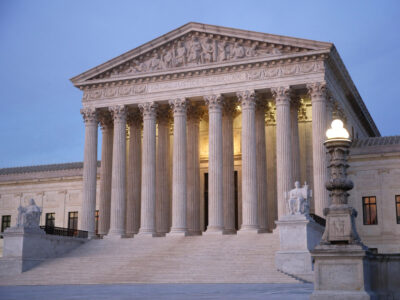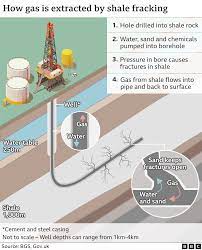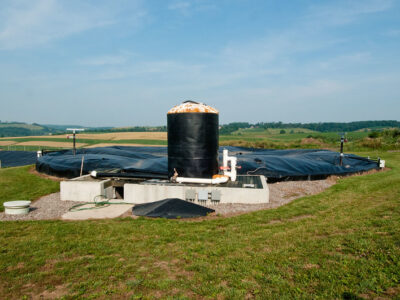Regulation
Evaluating Voluntary Agreements in the Bay-Delta Watershed
by Nell Green Nylen, Felicia Marcus, Dave Owen, and Michael Kiparsky
Updates to flow and other regulatory requirements for California’s Bay-Delta watershed are long overdue. For much of the last 12 years, state political leadership has prioritized efforts to develop voluntary agreements (VAs) with water users over completing updates to the watershed’s water quality standards. Now the State Water Resources Control Board has restarted the regulatory …
Continue reading “Evaluating Voluntary Agreements in the Bay-Delta Watershed”
CONTINUE READINGClimate Election 2024: Trump Plans to Drain the EPA
The battle plan for a second Trump term includes reinstating Schedule F to remove climate experts from the U.S. government.
Donald Trump could “F” the federal government. Literally. Far-right policy strategists are laying plans, largely endorsed by the Trump campaign, for getting rid of federal government workers who might otherwise stand in the way of a radical deregulation agenda. It’s called “Schedule F,” and it could be used to strip employment protections from as many …
Continue reading “Climate Election 2024: Trump Plans to Drain the EPA”
CONTINUE READINGThe U.S. Supreme Court & Environmental Law in 2024
Numerous Key Environmental Issues and Doctrines Will Confront the Justices This Year
As we begin 2024, it’s useful to identify and assess the many environmental issues that the U.S. Supreme Court has agreed to decide this year. It seems likely that the conservative majority of the justices will erode or, perhaps, dramatically jettison longstanding principles of environmental law and policy in the coming months. Summarized below are …
Continue reading “The U.S. Supreme Court & Environmental Law in 2024”
CONTINUE READINGMore Thrills and Chills Ahead! What to Expect in 2024
Here are the key events that will shape climate and energy policy.
We will face some important forks in the road in 2024 in terms of environmental law. Here are some of the upcoming forks. Who will be President in 2025? You probably don’t need reminding that 2024 is an election year. At this point, the election seems likely to be a replay of Biden versus Trump. …
Continue reading “More Thrills and Chills Ahead! What to Expect in 2024”
CONTINUE READINGReviewing Agency Indecision
The Third Circuit straightens out a quirk in FERC law, to the benefit of renewable energy.
A case decided by the Third Circuit on Dec. 1 is important for two reasons. It clarifies a puzzling procedural rule applying to the Federal Energy Regulatory Commission (FERC). And it upholds an important policy shift regarding renewable energy by the country’s largest grid operator. Since you’re probably more interested in the second point than …
Continue reading “Reviewing Agency Indecision”
CONTINUE READINGCOP28: “The Methane COP”
Methane was at the center of COP28. Here are some of the most relevant announcements of this year’s Conference of the Parties.
By far, the most ubiquitous figure at COP28 was that of John Kerry. The U.S. climate envoy strolled through the labyrinthine and confusing alleys of Dubai’s Expo City wearing an impeccable suit despite the almost 100-degree Fahrenheit winter weather of the United Arab Emirates. When he wasn’t walking, he was talking about methane, earning him …
Continue reading “COP28: “The Methane COP””
CONTINUE READINGThe New Frontier of Methane Regulation
Nations, companies, and NGOs are targeting methane like never before using satellite data. A new UCLA paper outlines what that could mean for regulation.
Methane is ready for its close-up. The first week of COP28, the UN climate talks taking place in Dubai, saw a handful of big announcements about how world leaders plan to tackle human-made climate change by targeting methane, a powerful short-term climate pollutant. The UCLA Emmett Institute is also drawing attention to the issue of …
Continue reading “The New Frontier of Methane Regulation ”
CONTINUE READINGWhy Do Small Changes in Global Temperature Matter So Much?
One problem is that we’ve pursued optimization rather than robustness.
Scientists are warning us that even comparatively small changes in average temperature may have disastrous results. If you turn up your thermostat 2 ºC (about 3.6 ºF), the difference may be noticeable but it’s no big deal. So why is that a scary increase in global temperatures? Some reasons are physical, particularly the difference between …
Continue reading “Why Do Small Changes in Global Temperature Matter So Much?”
CONTINUE READINGIt’s High Time to Ban “Monster Fracking” in California
Fracking consumes enormous amounts of water, pollutes aquifers & is contrary to our climate goals
Recently, the New York Times published an important and disturbing expose’ titled, “‘Monster Fracks’ Are Getting Far Bigger. And Far Thirstier.” The Times article focuses on the alarming intersection of three current environmental crises–water supply shortages, groundwater contamination, and excessive greenhouse gas emission levels–that threaten California and other states across the nation. Fracking (the shorthand …
Continue reading “It’s High Time to Ban “Monster Fracking” in California”
CONTINUE READINGLivestock Operations Are Responsible for Over Half of California’s Methane Emissions—Why Won’t CARB Regulate Them?
CARB will have the authority to regulate methane from livestock operations beginning in January but has not initiated rulemaking
At a recent California Air Resources Board (CARB) meeting, a staff member responded to a question about why CARB’s program for reducing emissions from transportation fuels incentivized the capture of methane from landfills so much less than the capture of methane from dairies: “Landfills have a different CI [carbon intensity] score because they are …
CONTINUE READING













